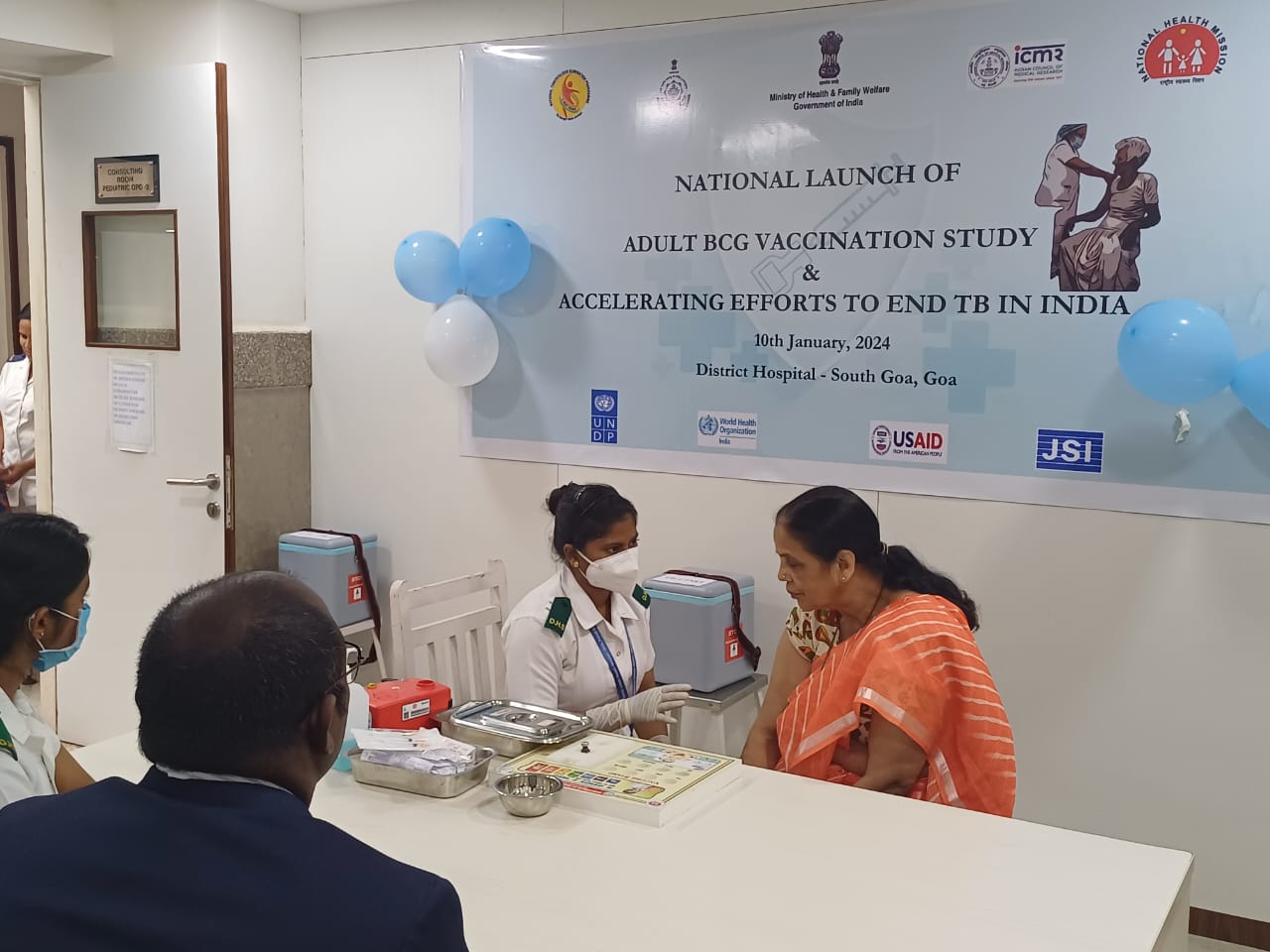Is India’s TB-WIN a game changing tool to end Tuberculosis?
August 29, 2024

A government health worker explaining the Adult BCG vaccination to a beneficiary in the state of Goa
A hacking cough would keep up Darshan, a daily wage construction worker from Haryana, on most nights. The 45-year-old was unable to work – the slightest physical effort had him gasping for breath. When he finally sought treatment at the nearest government hospital, he was diagnosed with Pulmonary Tuberculosis (TB) – a disease which still claims millions of lives world over. According to the 2023 Global TB report, the estimated TB rate was 133 new cases for every 100,000 people each year. India shoulders 27 percent of the total cases.
In addition to underlying co-morbid conditions like diabetes, a body mass index below 18, previous TB infections, or close contact with TB patients, factors such as being over 60 years old, having a history of smoking or substance abuse, and undernutrition are significant contributors to TB. This is why the disease predominantly affects the poor and marginalized, who often suffer from delayed diagnosis, inadequate care, incomplete treatment, and poor aftercare.
Can adult vaccination protect against TB?
Since 1921, the Bacillus Calmette–Guérin (BCG) vaccine, have been used world over to protect against TB. BCG Vaccination is also part of India’s Universal Immunization Programme and is administered to infants to protect them from the disease. Research shows that the same vaccine can also be used to protect vulnerable adults, with studies showing a 17% yearly decline in TB cases if vulnerable adults are vaccinated with BCG, and put on new treatment regimens. This step is crucial to achieve the goal of ending TB by 2030, especially as progress so far has been slow. According to a report by STOP TB Partnership - a hosted entity of the United Nations Office for Project Services (UNOPS) - the current global rate of decline of TB decline is a mere 1.5% to 2% per year.
TB-Win: Digital innovation meets targeted interventions to stop TB
The Sustainable Development Goals aim to eliminate TB by 2030. India is also aligned to this goal and has taken extensive steps to bring down TB infections across the country. The National Tuberculosis Elimination Programme (previously known as Revised National Tuberculosis Control Programme) seeks to reduce TB cases and mortality rates in India by 80 percent and 90 percent, respectively, by 2025, five years ahead of the global SDG target of 2030.
To support these efforts, MoHFW and Indian Council of Medical Research launched the “Adult BCG Vaccination Study” in January 2024 – an initiative to vaccinate vulnerable adults with the BCG vaccine, report the consequent change in notified TB cases and effectiveness of the vaccine. The study is being run with the help of an innovative digital health platform, TB-WIN, which has been developed by MoHFW with technical support from UNDP.
The TB-WIN platform records details of beneficiaries (people vulnerable to TB), logs their BCG vaccination and also keeps a record of follows up done by healthcare workers with vaccinated beneficiaries. This entire process ensures that vulnerable persons are vaccinated and reduces TB incidence.
The beneficiaries for this study are identified through a head-count survey done by ASHA workers or Auxiliary Nurse Mid-wives (ANMs) - last-mile healthcare workers who are critical to implementation of several public health programmes in India - and registered on TB-WIN as eligible for vaccination.
The ASHA or ANM then plans a vaccination session for eligible beneficiaries through TB-WIN and also records the administration of the vaccine though the platform. Post vaccination, the healthcare workers track and follow-up with each vaccinated person and log their status through TB-WIN. This follow-up is conducted periodically till 36 months from date of vaccination.
On the basis of the head-count survey, TB-WIN digitally generates a list of beneficiaries who are due for vaccination, enabling over 555,000 healthcare workers to ensure timely vaccinations for these individuals. The platform also provides beneficiaries with a digital acknowledgement and a QR code, which allows them to easily validate their vaccination status.
Key to this process is another digital platform - the electronic vaccine intelligence network (eVIN), which is also supported by UNDP. The BCG vaccine is susceptible to heat and light and is supplied as a freeze-dried preparation in vacuum-sealed, multi-dose, amber-coloured vials that must be diluted and used within 4 hours of reconstitution. eVIN ensures temperatures are maintained at prescribed levels from the point of manufacture to the time it is opened at the health centre.
TB-Win: A Successful Intervention
Since its launch, TB-WIN has logged over 4.66 million adult BCG vaccinations across more than 380,000 sessions. The initiative will soon be expanded to another 11 states, where incidence of the disease is high.
India’s Adult BCG Vaccination Study is an important step forward in the global fight to end TB. It serves as a successful public health case study on how digital innovation, combined with targeted interventions can make a significant impact. The implementation of TB-WIN and eVIN demonstrates how digital tools can enhance public health delivery systems and better serve at-risk populations and individuals such as Darshan.

 Locations
Locations
